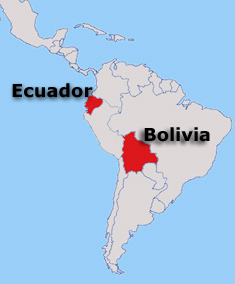Bolivia adopted a new constitution in December 2007 which gave more rights to the country's indigenous peoples. However, the far-reaching autonomy a number of the country's nine provinces exacted for themselves has made daily life for members of indigenous communities anything but easier.
 Nearby Ecuador, meanwhile, is working on a new constitution on its own, but the initial results of this drafting process have not met with a warm welcome from its indigenous peoples.
Nearby Ecuador, meanwhile, is working on a new constitution on its own, but the initial results of this drafting process have not met with a warm welcome from its indigenous peoples.
Bolivia
Where is Bolivia going? Roads leading in different directions. Two Bolivias. Federalism versus centralism. These are all possible descriptions for Bolivia's present situation, but none of them do justice to the problems faced by Bolivia's indigenous peoples, who make up the majority of its population.
The country's new constitution is most probably the best in Latin America when it comes to the rights of indigenous peoples. However, a corollary of the constitution is the autonomy exacted by Bolivia's richest departments. This has resulted in a severe limitation of the resources left to be divided amongst the poorest departments.
Decentralisation
Furthermore, this decentralisation at the national level is not always followed through on the local level. This means, for example, that in the richest region, Santa Cruz, local Indians are being pushed into less fertile areas by the ever-encroaching - mainly soya - plantations.
Alejandro Alegre, Education Secretary with Organización Indígena Chiquitana, which represents Santa Cruz's indigenous communities, says they fought for increased autonomy but are now in a worse position than before because they have no say at departmental level and national laws mean little in the areas where they live.
So, despite President Evo Morales being an Aymara Indian, the indigenous communities in Santa Cruz are seeing little benefit because their local government is in the hands of ‘whites' who are basically opposed to the ‘indianisation' of Bolivia.
Ecuador
Meanwhile, in Ecuador, the Constitutional Assembly has drawn up the first five articles of a new constitution, and the first one has been received badly by indigenous communities. It states that the country is a united entity, but the indigenous population wants something else: ‘plurinationality'. The Legislators argue, however, that to recognise different nationalities would jeopardise the concept of all the country's inhabitants being Ecuadorian.
Swept aside
The indigenous peoples are demanding their own nationalities be recognised and that they have a certain autonomy over their own territory and natural resources, as well as having the right to keep their own culture and way of life. They fear that, if their nationalities are not recognised, they will at be swept aside at some point in the future by the oil, mining or farming industries.
Without official recognition of this ethnic diversity, many believe indigenous people will remain marginalized by the dominant ‘white' and mestizo (mixed race) culture.
There is however, some reason for celebration in the case of article five of the draft constitution, which specifies that Ecuador is a peaceful territory which cannot host foreign military bases, as is currently the case with the US base in Manta.
A lot of bark, but little bite
Much has happened in these two Andean countries in recent years. There are undeniably good intentions to give indigenous people their rights. However, sadly enough, it appears that the poorest groups have little change or benefit in practical terms. And if the badly needed changes to the constitution, put together by well-meaning governments, fail to materialise, the future of these indigenous peoples will remain gloomy.
* RNW translation (mw)